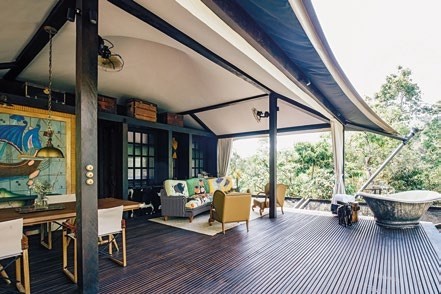We don’t all travel like billionaires to Davos, nor would we want to.


We don’t all travel like billionaires to Davos, nor would we want to. Watching our (literal) carbon footprint goes a long way towards preserving the planet and our resources.
Vote with your dollar when you support travel companies and brands that have sustainable practices, whether they are reducing waste, safeguarding the ocean, or using alternative fuels. The next time you travel, consider where and how you’d like to leave your (carbon) footprint.
LAGOM, VERBIER & ZERMATT, SWITZERLAND
The luxury travel company Lagom owns two ski resorts in Switzerland, and is dead set on helping you reduce your carbon footprint. Yes, you. Once you select your dates, you’ll get to pick your eco options and decide what’s enough for you. Daily housekeeping or twice a week? Want robes and slippers? As you tick or untick the boxes, a slider shows your carbon savings in kilograms, while another shows how much money you’ll save for each carbon-friendly choice. It’s radical because eco choices usually cost more, not less. (Dear thrifty Singaporean, choose all the most eco-friendly, costeffective options and you could save more than $3,000!).
“[As far as I know]… we’re the only people doing anything like this,” says Tash Robertson, who founded the company with her husband, Duncan. “Nobody has ever said, what if people would like to have less?” The British couple wants to upend the notion that luxury is about more. Hence the company name, Lagom, a Swedish word that means “suitable” or “just enough”. https://levlagom.com
SHINTA MANI, CAMBODIA


ALILA HOTELS & RESORTS, BALI, INDONESIA
Waste is a pressing issue, both in its generation and disposal. So what if there was simply no waste? It’s not wasteful thinking at all. The group’s innovative Zero Waste to Landfill policy – across all four of its Bali properties – tackles waste at its source and recycles it into useful resources.
The centrepiece of its work is the Integrated Sustainable Resource Recovery Facility, an on-site laboratory where waste is transformed into higher-value products, through science: plastics, glass and ceramics are shredded and crushed to produce sand and fibre that are reused to produce green building materials; metals and high-value plastics are recycled; and uneconomical waste plastics, such as wraps and films, are converted into a light crude oil that is distilled down to diesel, kerosene and gasoline for reuse. It is literally zero waste to the landfills.
The group even pays local kids for all the recyclable trash they can find. Guy Heywood, chief operating officer of the group, says: “There are economic benefits to doing this. And being able to see the benefits of our efforts will hopefully bring home the importance of Zero Waste to Landfill projects, for our employees, for our guests and for the local communities.” www.alilahotels.com

THE DATAI, LANGKAWI, MALAYSIA
Overfishing is a problem all over the world. If you can’t stop it, you can at least hatch a creative solution, as The Datai has done. Over the years, Langkawi fishermen have reported a decline in their annual fish catch, believed to be due to a combination of coastal pollution and poor fishing practices, and resulting also in a decline in the health of coral reef ecosystems.
Subsequently, the resort worked with local fishermen to launch a sustainable “Fish for the Future” initiative to tackle the problem. They’ve built a Fish Aggregating Device (FAD) – like a kelong – to provide a gathering point for a range of adult fish of varying sizes. The five FAD structures are deployed strategically next to the Datai Bay’s natural coral reef to simultaneously propagate algae and create additional space for the reef to spread to the structure. This provides local fishermen with an eco-fishing area and removes pressure from the natural coral reef. The best part is, the resort buys fish directly from the fishermen. Win-win. www.thedatai.com
CARRY ON
TUMI’S RECYCLED CAPSULES
The brand has bags made with a balance of recycled (70 per cent) and virgin materials. The materials are durable, and each bag has purposefullyengineered reparability in its design, so it can last even longer. The range of Recycled Capsules includes styles from the women’s Voyageur collection and men’s Alpha Bravo collection, each made from post-industrial and postconsumer waste material that would otherwise go into a landfill.
FREITAG BAGS
Text David Fuhrmann-Lim























